We are living in a new golden age of space opera. People have proclaimed the death of this vital subgenre many times over the decades—but like a deep space probe upgraded by godlike aliens, space opera keeps coming back. (See my article in Esquire for more details!) I recently wrote a whole space opera trilogy, full of all my favorite space things.
I wouldn’t be writing space opera if I hadn’t read some incredible examples of the genre and had my brain exploded. So here are eleven books that radically expanded my understanding of what space opera is capable of.
Note: Your favorite book is probably not on this list. And that’s okay! Please make your own list of books that shaped your feelings about space opera and share those in the comments!
Note #2: Some of these books, I read years ago. I apologize in advance if my summaries contain inaccuracies or bloopers.
The Hitchhiker’s Guide to the Galaxy by Douglas Adams
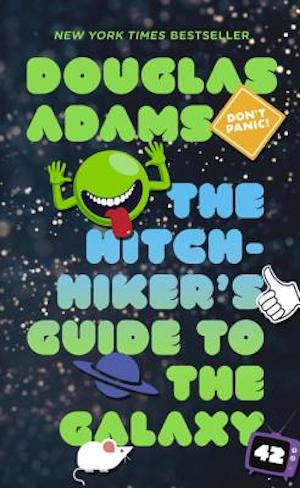
Yeah, me and everyone else. But this gloriously clever, subversive book really is essential reading. We’ve seen the story of Hitchhiker’s told in so many formats by now (including a Zork-y text adventure game) that it’s hard to remember how much anger and weirdness and wistfulness Adams packs into this novelization of his hit radio drama. Arthur Dent is the best example of a space opera mainstay: a human who is in no way larger than life, cast adrift in a huge, bewildering cosmos. But behind all the nightmare Vogon poetry and orbital whales is a profound awareness that the “meaning of life” is a fundamentally absurd notion and that panicking is our natural condition…but maybe it shouldn’t be? I think the foundational question of space opera is how tiny humans can find our way when space is REALLY BIG, and this book crystallizes it for me.
The Stainless Steel Rat by Harry Harrison
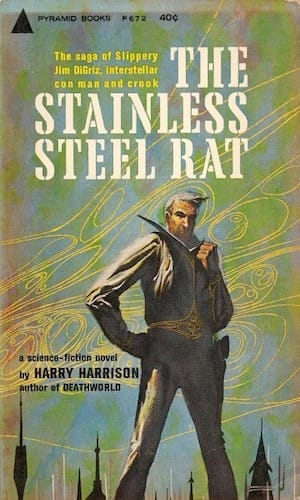
Okay, continuing the theme of ridiculousness…in high school, my friend John turned me on to these bonkers books, about an interstellar con man who falls in love with the super-assassin who keeps trying to kill him. And he runs for president of a planet! (Back then, the notion of a slimy con man getting elected president felt satirical.) Unlike Arthur Dent, “Slippery” Jim diGriz is hypercompetent and he definitely knows where his towel (and blaster) are. In a corrupt, rotten galaxy, an amoral con man can become kind of a good guy, using dirty tricks to clean up a planet. I often think about Harrison’s clever explanation of why an interstellar war would make no sense—essentially because given the costs of transporting goods between star systems, there’s nothing worth going to war for.
The Complete Hainish Novels and Stories by Ursula K. Le Guin
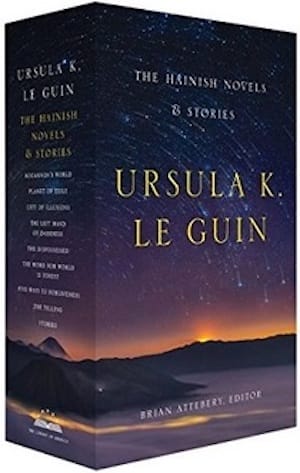
I’m cheating by including this ginormous doorstopper from the Library of America, comprising everything Le Guin wrote in her big space opera setting, including The Left Hand of Darkness and The Dispossessed, and a few other absolute classics. What I love about reading all of this stuff in one go is getting to see Le Guin building a whole universe. She absolutely does not care about canon or continuity, and contradicts herself from book to book. The paradigm-altering technology in her universe is not a weapon or a means of travel, but a communication device, the Ansible. Her benevolent galaxy-spanning organization, the Ekumen of All Worlds, sometimes finds ways to intervene when slavery and cultural genocide are being practiced. Her complex, flawed characters struggle, not with the vastness of space, but with the complexity of an individual culture on one world.
Dawn by Octavia E. Butler
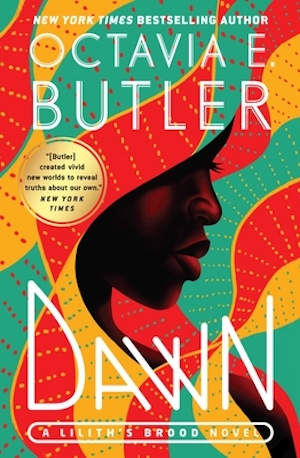
The first book of the Xenogenesis, or Lilith’s Brood, trilogy exploded my brain in the best possible way when I read it twenty years ago. Humans have finally made Earth uninhabitable, because of our accursed love of hierarchy, but some advanced aliens have saved some human beings, whom they want to interbreed with. Space opera frequently contains aliens who are either humans with minor differences, or god-blobs that cause psychedelic eye-barf. But the Oankali, Butler’s aliens, are genuinely unlike us and yet recognizably people, in a way that builds on what Le Guin was doing in books like The Left Hand of Darkness. The Oankali have a third gender, the Ooloi, and also an ingrained need to combine with other species. And they also provide a solid answer to the notion of the Great Filter (i.e., any species that becomes technologically advanced will wipe itself out) simply by being advanced without sharing all of our human nastiness. After reading this book, I could never think about “first contact” the same way again.
Consider Phlebas by Iain M. Banks
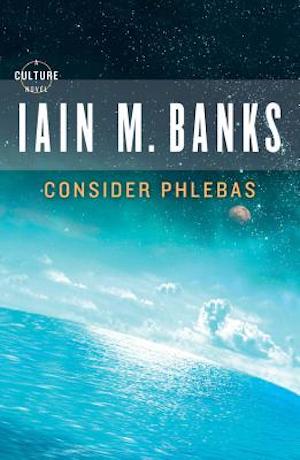
Back in the 1990s, someone recommended this book on a Blake’s 7 mailing list, as a fun ride that contains some of the same snarky, cynical flavor as the classic Blake’s 7. Relentlessly entertaining but also full of clever worldbuilding details, this book is a huge reason why I chose to devote my life to writing speculative fiction. I knew I could never write as well as Banks, but I was determined to try my best. Consider Phlebas was my introduction to the Culture novels, many of which I devoured in the ensuing years. It’s actually pretty atypical, in that the main character is an enemy of the Culture, and its highly advanced posthuman A.I.-driven worldview is heavily critiqued—but it filled me with curiosity and excitement to see more of these Minds and their quirkily-named starships.
House of Suns by Alastair Reynolds
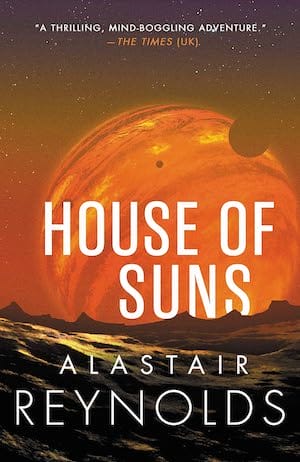
Banks arguably inspired a new wave of space opera centering artificial intelligences, posthuman heroes, and vast timescales as well as distances. (Props also to John Varley.) Alistair Reynolds, however, takes all of these ideas to new and different places, and this book was my introduction to his work. Full of characters who use cryogenic suspension and cloning to survive the long time periods involved in interstellar travel, this is a thrilling and dazzling story that plays with some of our fundamental notions of selfhood. And there’s a late reveal involving the requisite artificial intelligences that turns everything on its head splendidly. I reviewed it when it came out.
The Best of All Possible Worlds by Karen Lord
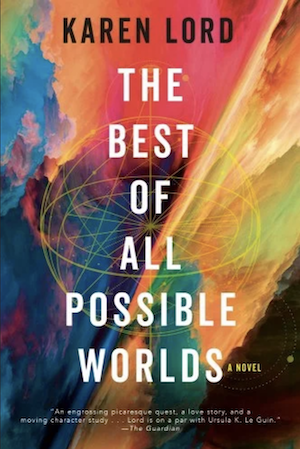
Lord excels in turning genre expectations upside down, and this book is a marvel. It starts with a horrific act of genocide, and then smoothly transitions into a sweet, thoughtful, often funny romance. The surviving members of the sadiri, a peaceful, rational people, are searching for mates to consider to continue their species. This leads them to a diasporic community, which has its own concerns. Basically, this feels like the sequel to 2009’s Star Trek that we never quite got, in which the survivors of Vulcan’s destruction search for a way to keep their culture and genes going in a harsh cosmos. But like I said, this book is surprisingly gentle and at times hilarious. Check out my full review from when it came out. Lord has released two other books set in this universe: The Galaxy Game, and the newly-released The Blue, Beautiful World.
The Long Way to a Small Angry Planet by Becky Chambers
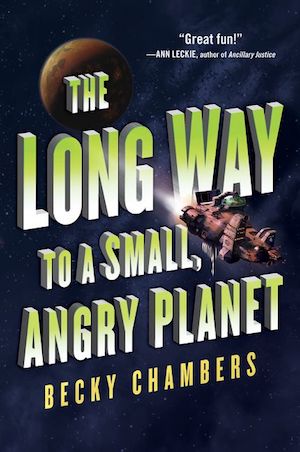
At a certain point, the kind of space opera that Banks and Reynolds were doing, where everyone’s a posthuman and A.I.s run everything, kind of gave way to what everyone calls “blue-collar space opera,” inspired by the movie Alien among other things. (See the Esquire article I linked above.) Part of what’s so great about Chambers’ debut is that it manages to do the “blue collar” thing without either A) lurching into “dark and gritty” territory or B) abandoning A.I.s altogether. In fact, TLWTASAP is mostly full of kindness and a playfulness, and the differences among human, non-human, and A.I. crewmembers are celebrated and explored in a gentle fashion. There’s a legit Star Trek-y ethical conundrum at the end of this book, which gets resolved in a somewhat “Tuvix” fashion, and you’ll be left endlessly debating whether the solution was right or wrong.
The Mimicking of Known Successes by Malka Older
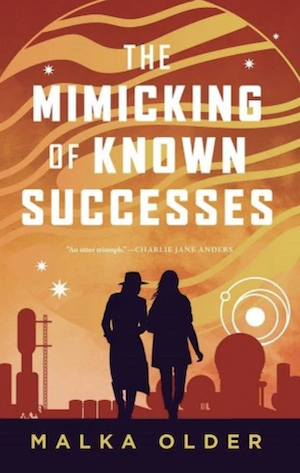
Now we’re getting into a few pretty recent books, all three of which are already among my favorite books of all time. First up, this delightful murder mystery which, to be fair, really only takes place on one planet: Jupiter, in a future where humans have screwed up both Mars and Earth. Similarly to The Best of All Possible Worlds, Mimicking takes a seemingly dark premise and goes in a surprising, charming direction with it. My elevator pitch for this book has been: “If Dorothy L. Sayers wrote Gaudy Night, but set it in orbit around Jupiter.” Mossa is a very Sherlock Holmes-esque investigator, with a dry wit and a somewhat dispassionate manner at times, and her latest case involves the university where her ex-girlfriend, Pleity, works. The two of them have to team up to solve what appears to be a murder, and soon their romance is no longer just in the past. It’s wonderful stuff.
The Red Scholar’s Wake by Aliette de Bodard
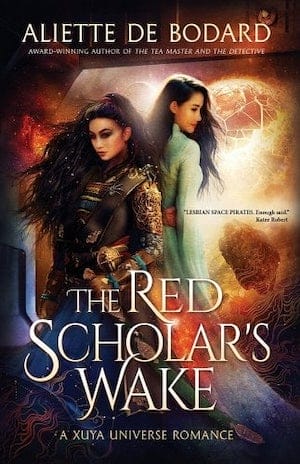
Speaking of romance… This book is swoon-worthy. I heard de Bodard read from it on a Zoom reading before it came out, and I was utterly hooked, to the point where I had to hunt down a copy from the UK because it wasn’t out stateside yet. Xích Si, a poor bot-maker, gets captured by space pirates, and expects to be executed or sold into slavery… but instead, the human avatar of the pirate ship, Rice Fish, comes to her and proposes marriage. Their wedding will be purely a matter of convenience, allowing Xích Si to do some work for Rice Fish without getting murdered by Rice Fish’s son or her other rivals. But of course, the thing that happens with pretend-marriages in fiction happens here. Oh, and did I mention that Xích Si hates pirates? There are sex scenes here involving bots that blew my mind, and there’s some truly excellent space combat too. This was my introduction to de Bodard’s Xuya universe, and I’m hooked. (Out nowish: the second Xuya romance, A Fire Born of Exile.) I reviewed The Red Scholar’s Wake here.
The Deep Sky by Yume Kitasei
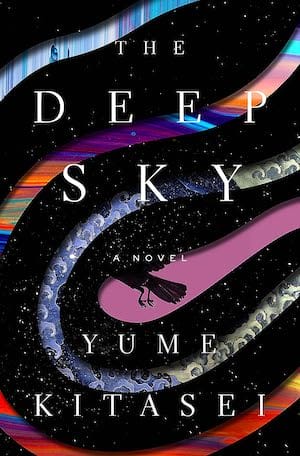
It’s rare to find one science fiction murder mystery where the “mystery” part is satisfying, let alone two—but this book is just as good as Mimicking. The Deep Sky takes place aboard the first ship ever to leave the solar system, where the crew consist entirely of cis women and non-binary people. (Every crewmember is supposed to get pregnant via artificial insemination halfway through the journey, for reasons I found slightly unconvincing. But I love this book so much otherwise, I didn’t care.) The protagonist, Asuka, is a Japanese-American girl who was chosen to represent Japan on the mission but struggles with feeling as though she’s not Japanese enough, along with general imposter syndrome. Asuka’s virtual-reality implant starts malfunctioning, which means every time she comes close to another person, she sees their VR environment instead of her own—which is a clever way of letting us learn about a lot of characters quickly, and also a comment on how boundaries get hard when you’re stuck in an enclosed space. Matters get more complicated when there’s a deadly explosion that also knocks the ship off course. And some of Asuka’s crewmates turn out to be members of eco-fascist and white supremacist groups, respectively. The Deep Sky takes a lot of the mainstays of the “colony ship” subgenre, including the tricky slingshot maneuver and the angst over leaving home forever, to new and fascinating places. (I reviewed it here.)
This article was originally published at Happy Dancing, Charlie Jane Anders’ newsletter, available on Buttondown.
Charlie Jane Anders is the author of the young-adult trilogy Victories Greater Than Death, Dreams Bigger Than Heartbreak, and Promises Stronger Than Darkness, along with the short story collection Even Greater Mistakes. She’s also the author of Never Say You Can’t Survive (August 2021), a book about how to use creative writing to get through hard times. Her other books include The City in the Middle of the Night and All the Birds in the Sky. She co-created Escapade, a trans superhero, for Marvel Comics, and featured her in New Mutants Vol. 4 and the miniseries New Mutants: Lethal Legion. She reviews science fiction and fantasy books for The Washington Post. Her TED Talk, “Go Ahead, Dream About the Future” got 700,000 views in its first week. With Annalee Newitz, she co-hosts the podcast Our Opinions Are Correct.










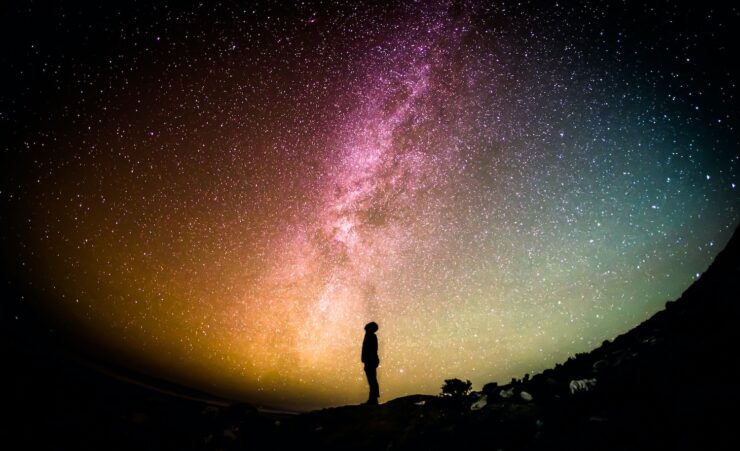



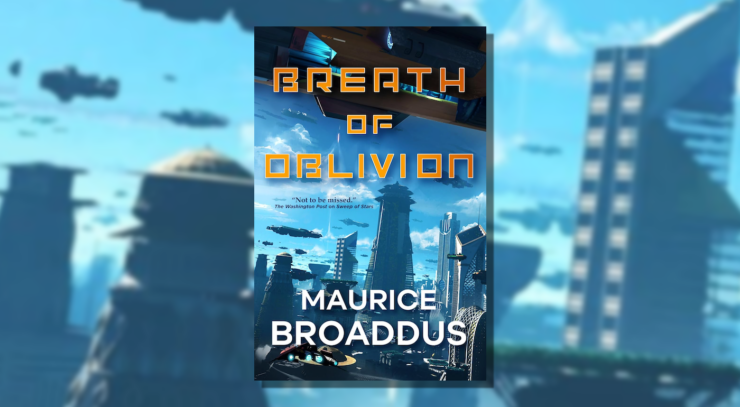
My, some good books here. May I offer some things?
The obvious: Vorkosigan Saga by LMB
The not so obvious: Princes of the Air by John M. Ford (God, I miss you Mike)
The most recent that rattled my cage: Imperial Radch trilogy, especially the first book Ancillary Justice. Glorious!
Finally, on the tabletop, there will always be the three little black books I owned before I ever heard of DND: Traveller.
@1 I second your admiration of Ann Leckie’s work. She cut her space opera teeth reading C.J. Cherryh (now there’s space opera for you, the ‘Foreigner’ series) and then went and did her own thing, expanding the field.
I am a fan of what Derek Kunsken is doing, especially his latest series about communities in the atmosphere of Venus: ‘The House of Styx’. I have yet to read his follow-up, ‘The House of Saints’ but am looking forward to it.
Oh, and can I mention Yoon Ha Lee’s Hexarchate series, starting with ‘Ninefox Gamit’. Space opera where mathematical manipulation of ‘calendars’ affects physics, and a dead general is still the scariest person in the universe.
“Yours in calendrical heresy”.
@3 Gambit, not Gamit. That slipped by me. The others in the series are ‘Revenant Gun’ and ‘Raven Stratagem’.
For the definitive dissenting view on space opera’s conventions: The Centauri Device by M. John Harrison (a direct influence on at least a couple of authors on this list).
Seeing “Stainless Steel Rat” on the list made my day. I never got why Harrison’s creation didn’t get more attention.
hashtag-showing-my-age:
The Lensman books. While old and creaky they did something very new in space opera: NOT ALL NONHUMANS ARE ENEMIES! Unlike Smith’s Skylark books where the heroes automatically sided with humanoids (even having a motto: Humanity Triumphant, Not Incorporated) Lensman has nonhuman heroes and main characters. In one sequence a human lensman looks at a nonhuman lensman and says words to the effect of “appearances are meaningless; he’s one of us.”
Admittedly there are other problems with this series (eugenics) but this was a landmark step from “all aliens are evil” to “some aliens are evil and so are some humans.”
I was interested in seeing your comment that the Consider Phlebas is atypical in that it critiques the Culture: I think most of the books take an antagonistic look at the Culture in a lot of ways, almost as though Banks thought his creation was too good to be true and had to expose the ways in which it wasn’t as pure as people might think. The actions of Special Circumstances and their agents are sometimes morally fuzzy and we frequently get an outsider’s disapproving eye cast over the lifestyles of its inhabitants (mostly to show what the character is like, but still…). And I’m glad that you champion Phlebas: there’s a lot of people out there these days who don’t think this is a very good novel in the series when it is a brilliant introduction to it.
@6 The Rat is one of my favourite characters in all of fiction. I, too, am baffled by how he is considered a mere footnote in the history of SF.
I will second C. J. Cherryh, the Chanur Legacy novels are perhaps my favorite of all time, not to mention the Alliance-Union series. Elizabeth Moon, the Serrano Legacy and Vatta’s War series. Glen Cook’s Starfishers Trilogy.
Re: Consider Phlebas
@8 I suspect that some folks are put off by the fact that after a really strong start, the reader has to slog through a chapter (or is it more?) of really disturbing and offensive imagery in order to get back to the good parts. I suspect that a lot of readers never make it past that section and that’s a real shame. When recommending the book, I’ve told folks to just skip that part. It adds nothing.
@6
Indeed. And why has no-one tried to make a film/tv series of it?
Back when I first read it, I considered Bruce Campbell a shoe-in for Slippery Jim.
If I were in charge of casting now, it’d be Zach Levi. With Jodie Comer as the assassin.
Having read most of Banks’s Culture novels, I still think — contrary, I’m sure, to the prevailing wisdom — that Consider Phlebas is the best of the lot. Some are more interesting than others, but, honestly, that first one out of the gate is one of the few I’ve read more than once. It would make a brilliant film or limited series.
As for the ‘disturbing and offensive imagery’, I’m having a hard time remembering what that would be. Maybe I just have a stronger stomach than some. I mean, it’s hard to beat The Wasp Factory.
@12
“Horza stared, horrified, at the golden giant, unable to think of anything to say. What could you say to people like this? Horza cleared his throat, still hoping to say something, but Fwi-Song went on. ‘Be told then, gift of the sea, that we are the Eaters; the Eaters of ashes, the Eaters of filth, the Eaters of sand and tree and grass; the most basic, the most loved, the most real. We have laboured to prepare ourselves for our day of testing, and now that day is gloriously near!’ The golden-skinned prophet’s voice grew shrill; folds of fat shook as Fwi-Song’s arms opened out. ‘Behold us then, as we await the time of our ascension from this mortal plane, with empty bellies and voided bowels and hungry minds!’ Fwi-Song’s pudgy hands met in a slap; the fingers interweaved like huge, fattened maggots.”
Any time I hear “space opera” I immediately think of Vernor Vinge’s excellent “A Fire Upon The Deep.”
It doesn’t get properly space opera until the sequel, but A Memory Called Empire by Arkady Martine definitely broadened my mind as to the possibilities of space opera.
Ken Macleod’s Fall Revolution series gave me a political education, and if you really squint you can see the upcycled bones of pub chats between Ken and his friend Ian Banks arguing about politics.
@14 I was here to plug Vinge’s A Deepness in the Sky, which has two competing human cultures racing to a newly-discovered inhabited planet. The new planet is inhabited by spider-like aliens, who, strangely, are more human than the humans. It really is excellent, although Vinge does have trouble creating main characters that you actually want to spend time with.
This is the problem with Consider Phlebas as well. Compared to his later novels, the main character isn’t particularly appealing. Still, it got me hooked on the Culture series.
@9 I “third” C.J. Cherryh, though I was unaware of the genre being described as “Space Opera” until recently. I just knew I enjoyed her works as great stories. I, too, love the Chanur series, though Morgaine is a close runner-up.
Would anyone consider The Expanse as a Space Opera?
All the books listed here are either books I like or books that sound good. But a few of them I feel like they “change how one thinks about space opera” because . . . they’re not space opera. Like, I don’t think picaresque journeys through space become space opera just because the travel is through quite a bit of space.
I definitely want to join people shouting out for Vorkosigan books.
But I’d also like to talk up the Uplift Wars by David Brin. I’m not sure how much it changed how I think about space opera. But I do feel like it massively invigorated the genre. It was like the biggest space opera series ever, in the sense that it just had more space-opera-ness than any other SF novels before or since, with the possible exception of Lensmen. It had aliens and more aliens who were really dang alien in various different ways, it had heroic humans, it had heroic dolphins, it had heroic chimpanzees, it had villainous dolphins and villainous chimpanzees, it had a really different galactic civilizational structure that was really interesting and had a lot of implications, it did not take that structure for granted but followed people trying to make room for themselves that the structure didn’t really allow, and ultimately it destabilized the whole thing, it had environmentalism, it had secrets, it had ancient stuff, it had the Library . . . Like I say, it had So. Much. Stuff. And most of it was great, and some of the books had absolutely amazing plot (Startide Rising is always worth a re-read). And I can’t back this up, but I feel like it came out at a time when people were kind of feeling like space opera was kind of played out, and made a pretty massive statement that no it wasn’t.
A great list, plus a couple I have yet to read. I only just got to The Red Scholar’s Wake last week.
And great to see Le Guin and Chambers on the same page. Becky Chambers cites Left Hand of Darkness as the book that turned her on to SF. It had a pretty big influence on me too.
@16 Deepness was my first Vinge book, and it was very good; but I found “the Focus” disturbing enough that I’ve never gone back to it and I don’t remember much about any of the characters. It’s been a while since I’ve reread Fire, but I believe I enjoyed spending time with most of the main characters.
Either way, they’re both worthy of a recommendation, and since Deepness is a loose prequel to Fire they go well together :)
Then there’s most of Jack Vance’s non-fantasy output. I highly recommend the Demon Princes series. A bunch of others are equally good. They all have a thoughtful core wrapped in crunchy space opera.
I’ve always found it difficult to pin down “Space Opera” as a genre–it’s more of a “feeling” to me. If I can imagine a setting that’s strange and wonderful (in both good and bad ways) and challenges as many of our assumptions as can fit on a page, it earns a place on that shelf of mine.
“Dune” is absolutely space opera, (albeit heavy on the “opera” part). Anne McCaffrey’s Talents series (Rowan, Damia, etc.) and her Ship Who Sang series and the Crystal Singer books all helped define Space Opera for me growing up.
More recently, Jim C. Hines’ “Janitors of the Post-Apocalypse” has earned its place in my Space Opera lineup. A humanity that’s both (somewhat) survived an apocalypse AND joined an interstellar collective it has almost no chance of running is the kind of story that hit all the right notes for me and made me question while giving me hope at the same time. And laughing my guts out quite frequently.
Agree on nearly all, plus Playing God by Sarah Zettel (and probably other books she has written that I haven’t managed to read ye). Oh and the series that begins with Saturn Returns by Sean Williams.
Two series that have done unusual and interesting things with the space opera subgenre (or flavor, whichever you like):
Patricia Kennealy-Morrison’s Keltiad novels, beginning (in publication history, if not in chronology) with The Copper Crown, are a fusion of space opera with epic (and specifically, Celtic and Arthurian) fantasy. If Star Trek‘s Klingons were “the Mongol Hordes with spaceships and ray guns” – a phrase that dates back to their introduction in the original series, the Kelts of these books were the Sidhe with spaceships, laser swords, and genuine magic besides. I can think of very few writers since who’ve attempted as thorough a cultural fusion of high-tech with pure sword and sorcery as these. I won’t say it hasn’t been done at all – there are bound to be books and authors I’ve missed – but Kennealy’s worldbuilding is incredibly ambitious, and at least to my mind, mostly successful.
The Mageworlds novels by Debra Doyle and James D. Macdonald are also well worth a look back. Two observations here. First, although the universe in these also blends science and sorcery – in this case, alien sorcery with something of a Star Wars quality about it – the structure of the underlying conflicts is unusual. Here we have two cultures, a human empire and the nominally alien Mageworlds, who have been in a state of sharply divided standoff for a long time. Thus there’s more of a “cold war” atmosphere than there is one of outright space battle. And we have a strong female lead in Beka Rosselin-Metadi, at once heiress to the Empire and semi-notorious space pirate, heading an intriguing ensemble cast.
The second thing about the Mageworlds books is that whereas the Mageworlds are initially regarded as the enemy, there are also books set in and taking the POV of Mageworlds characters. That’s fairly uncommon in the broad run of space opera (though definitely not unknown; Cherryh for one goes there much earlier), and adds an intriguing dimension to the overall series.
Teles of Pirx the Pilot, by Stanislaw Lem. Except, when I read it, i didn’t know what space opera is. :)
They were first translated in Bulgarian in 1974, but I got to ready the second edition from 1981. The translation contained more then one problem with the technical terms, but this was a very different kind book, and being written by Lem, was slow and thoughtful by modern standards.
I’m surprised no one has mentioned Stephen Donaldson’s Gap series. Very interesting aliens, very complex protaganists (not your usual “heroes”)
It’s wonderful to see so many long-favorite titles listed. Harry Harrison’s Star Smashers of the Galaxy Rangers (1973) was my eye-opening introduction to what can be done when levity, satire and action are thoroughly mixed together.
I came here to put a hand up for Sharon Lee and Steve Miller’s long running Liaden series ( I should get used to calling it the Korval books now that focus has shifted so far away from the planet Liad). Character-centric stories that have cultural conflict and great space battles will always be my catnip.
I’m not sure if the Murderbot Diaries count as space opera, but they definitely changed my tastes in sci-fi.
Great list! My to-be-read pile just got taller. The series that really opened the genre for me was Jacob’s Ladder by Elizabeth Bear (Dust/Chill/Grail) because it brought the “opera” to the party. Strong, mythic characters with big emotions and a wild story built on a foundation of science and relationships. I also love her White Space books, Ancestral Night and Machine, with their humor, warmth and expanded view of sentience and human potential.
I have 10 different Stainless Steel Rat paperbacks that I have read. There are probably more. The first couple of books were great to read, then the books started losing their shine. This destroyed the reputation of the whole series. I lost interest in continuing to read the series.
As Charlie Jane Anders points out the first one is ridiculously fun to read. Perhaps he should have stopped after the first 5, but Harrison’s Stainless Steel Rat books were in high demand when they were published. And, who can deny the clamor of people waiting for a next book.
I honestly can’t fathom why nobody has mentioned Andre Norton’s Moonsinger books, or for that matter, much of her bibliography period! To me, her books always seemed the quintesscence of space opera. Also a little surprised that nobody’s mentioned any of C.J. Cherryh’s early space operas, like The Faded Sun trilogy.
No mention of Peter F. Hamilton?
@31 I thought of her Faded Sun trilogy, but as I appreciate Morgaine and Chanur more, I somehow neglected to include it. Regrets.
I love some of her standalone books, too, like Rimrunners, and Cuckoo’s Egg is superb!
My ride-or-die space opera hall of famers:
–The Chanur series, Downbelow Station and the Faded Sun trilogy from CJ Cherryh
–“The Stars My Destination” by Alfred Bester
— Moon of Three Rings by Andre Norton
The latter two I found as a teen many decades ago. Norton recommended Cherryh’s first published novel, Gate of Ivrel. As the saying goes, it was all over after that.
@17
“The Expanse” series most def qualifies in my book as space opera.